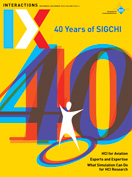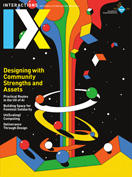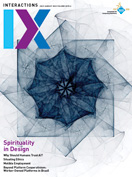Table of Contents
VOLUME XXIX.6 November - December 2022
-
WELCOME
-
40 years of SIGCHI
Mikael Wiberg, Daniela Rosner, Alex Taylor
In this issue of ACM Interactions, we celebrate the 40th anniversary of the Special Interest Group on Computer-Human Interaction (SIGCHI). This celebration involves looking back and reflecting on our complex history and community through a set of voices and dialogues that represent the multiple perspectives, thoughts, and approaches taken…
-
-
What are you reading?
-
Sharon Bautista
Sharon Bautista

"Everything is born from our mind, from our way of looking." These words may sound like they come from a designerly text on managing bias, but they are from the teachings of Thich Nhat Hanh, the Vietnamese Zen monk, teacher, and activist who passed away at the start of…
-
-
Blog@IX
-
Breaking stereotypes: Islamic feminism and HCI
Hawra Rabaan, Lynn Dombrowski

As HCI matures into a richer discipline interlacing with the humanities and social sciences, there has been a growing consciousness to embrace pluralist [1] and intersectional approaches in understanding and addressing systems of oppression within computing [2]. Islamic feminism and intersectional feminism are highly complementary approaches to understanding oppression…
-
Using technology to improve communication in panels
Jonathan Grudin

Panels can be fun to develop—they can also be much more effectively executed. This spring I was on two large panels that were the best organized of any I've participated in. Technology was used in advance to reduce psychological uncertainties, which increased interaction and kept us focused on our…
-
-
Exhibit X
-
Climate beacons: creative collaboration and public engagement
Lewis Coenen-Rowe, Emma Hall
Global climate change is accelerating, and its impacts are already widely felt, particularly by the most vulnerable. How can we urgently engage with communities to promote understanding and connection so that we can confront the climate crisis together? Climate Beacons for COP26 connects the arts, heritage, and culture sectors…
-
-
Columns
-
Living with soft dragons: between science fiction and human-computer interaction
Jaz Hee-jeong Choi, Ted Chiang

We met in 2012 while teaching at a summer school at KAIST in South Korea. We've met again since then, each time over delicious food, when luck brought our bodies to Seattle or Melbourne. But Jaz has met Ted's writings many times and in many different forms and languages,…
-
Know your experimental uncertainty
Lace Padilla

Throughout a career in HCI, most people will read dozens if not hundreds of reported statistics from user studies and experiments. The vast majority of these reports used 95 percent confidence intervals (CIs) with visually depicted error bars to express the uncertainty in the scientific findings. With years of…
-
-
Making/breaking
-
Multispecies worlding through design
Michelle Westerlaken

Speciesism—the oppression of other animals—is often completely normalized within human societies. This makes it challenging to imagine design work that can encourage more-detailed multispecies interactions between humans and the animals with whom we share our lives. Over the past decade, I have worked toward a design program that seeks…
-
-
Forums
-
Twitter, Facebook, and Google all have a trust problem
Sareeta Amrute

Elon Musk premised his Twitter takeover on a promise to bring "free speech" back to the social media platform. What that means in practice is unclear, and Musk's one-sided understanding of the concept—which emphasizes unchecked expression and skepticism of content moderation—is not reassuring. Experts and democratic activists point out…
-
Platform work and the erosion of community networks in the global south
Ira Anjali Anwar, Zothan Mawii

Over the past decade, critical inquiries into digital labor platforms have become prolific across disciplines. However, in CSCW and HCI spaces, research has focused on Western labor markets and largely ignored "feminized" vocations, focusing instead on male-dominated platforms such as ride-sharing or crowdwork. As much as there are shared…
-
-
Community square
-
The road we’re on
SIGCHI Executive Committee

As the SIGCHI Executive Committee (EC), we aim to create and sustain a thriving SIGCHI community founded on robust, nurturing, and inclusive processes around the generation of human-computer interaction (HCI) knowledge by providing supporting infrastructures for our growing membership to do their best HCI work. To realize this vision,…
-
-
Features
-
What simulation can do for HCI research
Roderick Murray-Smith, Antti Oulasvirta, Andrew Howes, Jörg Müller, Aleksi Ikkala, Miroslav Bachinski, Arthur Fleig, Florian Fischer, Markus Klar

The early days of every engineering subject involved examples of expensive failure. The skilled artisans of the day succeeded in making gradual progress, but these successes were punctuated by disasters that occurred when they made too large of an innovation step. From the collapse of cathedrals in France to…
-
Esports and expertise: what competitive gaming can teach us about mastery
Ben Boudaoud, Josef Spjut, Joohwan Kim, Arjun Madhusudan, Benjamin Watson

Historically, much research and development in human-computer interaction has focused on atomic and generalizable tasks, where task completion time indicates productivity. The emergence of competitive games and esports, however, reminds us of an alternative perspective on human performance in HCI: mastery of higher-level, holistic practices. Just as a world-renowned…
-
HCI for general aviation: current state and research challenges
Sebastian S. Feger, Felix Ehrentraut, Christopher Katins, Philippe Palanque, Thomas Kosch

Airplanes are among the most common modes of everyday transportation in many countries and rural areas, sometimes preceding cars or trains. This part of aviation, characterized by nonprofessional, noncommercial civilian pilots flying to conduct routine tasks or for pleasure, is referred to as general aviation (GA). In the U.S.…
-
Making social impact commonplace
Elizabeth M. Gerber

Do you like receiving awards? If so, you are not alone. Most of us appreciate being recognized, even if it's a bit awkward to receive an award that would not have been possible without the help of many collaborators. Insights → Applying human-computer interaction research to social impact…
-
-
Dialogues
-
SIGCHI at 40: celebrations and aspirations
Andrew L. Kun, Elizabeth Churchill, Tamara L. Clegg, Jonathan Grudin, Kristina Höök, Daria Loi, Yolanda Rankin, Elizabeth Rosenzweig, Kentaro Toyama, Susan Dray

To celebrate 40 years of SIGCHI, we came together for a panel at the CHI 2022 conference. Conceived by Susan Dray and moderated by Andrew Kun, the panel sought to inspire the SIGCHI community. The panelists—Elizabeth Churchill, Tamara L. Clegg, Jonathan Grudin, Kristina Höök, Daria Loi, Yolanda Rankin, Elizabeth…
-
Becoming a global organization
Adriana S. Vivacqua

Over the years, SIGCHI has evolved its global presence, something it's had since its founding in the U.S. in the early 1980s. In this article, using reports in the SIGCHI Bulletin [1], we trace the history of SIGCHI's global presence, efforts, and initiatives through the years, closing with the…
-
A chronology of SIGCHI conferences: 1983 to 2022
Neha Kumar, Julie A. Adams, Bill Buxton, Linda Candy, Pablo Cesar, Leigh Clark, Benjamin R. Cowan, Anind Dey, Phoebe O. Toups Dugas, Ernest Edmonds, Michael A. Goodrich, Mark Green, Jonathan Grudin, Yoshifumi Kitamura, Joe Konstan, Celine Latulipe, Minha Lee, Tom Malone, Regan Mandryk, Panos Markopoulos, Michael Muller, Lennart Nacke, Yukiko Nakano, Marianna Obrist, Martin Porcheron, Aleksandra Sarcevic, Johannes Schöning, Stacey Scott, Bonita Sharif, Frank Steinicke, Simone Stumpf, Edward Tse, Vinoba Vinayagamoorthy

Conferences form the backbone of SIGCHI. They are the reason we exist as a collective entity and a special interest group. They connect us and bring us together as a community of human-computer interaction (HCI) researchers, educators, students, and practitioners. In this article, we take stock of SIGCHI's portfolio…
-
‘It changed my life’: stories of SIGCHI’s influence
Susan Dray, Elizabeth Buie, Gillian Crampton Smith, Assem Kroma, Xiang Li, Aaron Marcus, Monica Pereira, Cuauhtémoc Rivera-Loaiza, Janice Rohn

Earlier this year, we issued an open call for stories about how SIGCHI has positively affected people; the response was quite good. Submissions came from a wide variety of people—an undergraduate who was just beginning their Ph.D. journey, a graduate student, an early-career professor, several senior researchers, and several…
-
-
Calendar
-
Calendar
INTR Staff

November CHI PLAY '22 (Bremen, Germany and virtual) November 2–5, 2022 https://chiplay.acm.org/2022/ AoIR '22: Association of Internet Researchers (Dublin, Ireland) November 2–5, 2022 https://aoir.org/aoir2022/ CSCW '22: 25th ACM Conference on Computer-Supported Cooperative Work and Social Computing (virtual) November 8–22, 2022 https://cscw.acm.org/2022/ MUM '22: 21st International Conference on Mobile and…
-
-
Exit
-
capmo: a computational drawing index of IRL flexibility through captured motion
Lee Blalock

Contributor: Lee Blalock http://leeblalock.com [email protected] Curator/Editor: Nia Easley The drawing here was created by combining my research in biomechanics as it pertains to robotics with my movement-based recreational activities. Specifically, I'm using motion captured while on skates and translating it through creative code. There are three principles guiding this…
-


